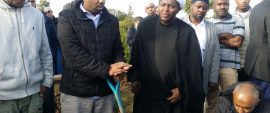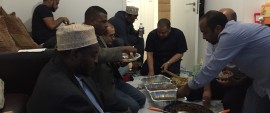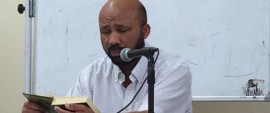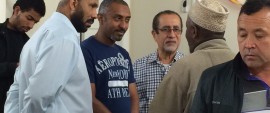5/10/2020 – Sheikh Ayub. Weekly ahkam class
Short notes on rulings discussed that are found in surah baqara
Surah Al-Baqara, Verse 110:
وَأَقِيمُوا الصَّلَاةَ وَآتُوا الزَّكَاةَ وَمَا تُقَدِّمُوا لِأَنفُسِكُم مِّنْ خَيْرٍ تَجِدُوهُ عِندَ اللَّهِ إِنَّ اللَّهَ بِمَا تَعْمَلُونَ بَصِيرٌ
And keep up prayer and pay the poor-rate and whatever good you send before for yourselves, you shall find it with Allah; surely Allah sees what you do.
(English – Shakir)
via iQuran
Whatever you give out for the sake of Allah, is an investment for you, for your akhira. Allah is all seeing, and is aware of all that you do.
Surah Al-Baqara, Verse 113:
وَقَالَتِ الْيَهُودُ لَيْسَتِ النَّصَارَىٰ عَلَىٰ شَيْءٍ وَقَالَتِ النَّصَارَىٰ لَيْسَتِ الْيَهُودُ عَلَىٰ شَيْءٍ وَهُمْ يَتْلُونَ الْكِتَابَ كَذَٰلِكَ قَالَ الَّذِينَ لَا يَعْلَمُونَ مِثْلَ قَوْلِهِمْ فَاللَّهُ يَحْكُمُ بَيْنَهُمْ يَوْمَ الْقِيَامَةِ فِيمَا كَانُوا فِيهِ يَخْتَلِفُونَ
And the Jews say: The Christians do not follow anything (good) and the Christians say: The Jews do not follow anything (good) while they recite the (same) Book. Even thus say those who have no knowledge, like to what they say; so Allah shall judge between them on the day of resurrection in what they differ.
(English – Shakir)
via iQuran
This verse is teaching us not to be judgemental. Although this verse mentions the Jews and Christians, it also mentions those who do not have knowledge also being those who judge in this manner (pointing and judging and claiming people are wrong)
We as Muslims should speak according to the measures in place, and should not judge nor comment negatively on people – we cannot guarantee that we will stay on the path that we are on.
Story of Prophet Musa:
He struggled to understand how people can go astray from God who has given them everything. Allah SWT says to Musa, look at my sun – it shines to those who are good and bad, believers and disbelievers. My mercy reaches all my servants, I can destroy all if I want, but they are my servants and I know that some may change for the better and others for the worse, and so leave these matters and leave this to Allah SWT.
Imam Jaffar as-sadiq: When the holy Qur’an was revealed, it was not only revealed for the people of the time. It was revealed for the people of all times, until the day of judgement.
La’nat can be sent on those worthy of it – the ‘ma’luunia’, those who have been cursed. As Allah says this in the holy Qur’an.
Surah Al-Baqara, Verse 114:
وَمَنْ أَظْلَمُ مِمَّن مَّنَعَ مَسَاجِدَ اللَّهِ أَن يُذْكَرَ فِيهَا اسْمُهُ وَسَعَىٰ فِي خَرَابِهَا أُولَٰئِكَ مَا كَانَ لَهُمْ أَن يَدْخُلُوهَا إِلَّا خَائِفِينَ لَهُمْ فِي الدُّنْيَا خِزْيٌ وَلَهُمْ فِي الْآخِرَةِ عَذَابٌ عَظِيمٌ
And who is more unjust than he who prevents (men) from the masjids of Allah, that His name should be remembered in them, and strives to ruin them? (As for) these, it was not proper for them that they should have entered them except in fear; they shall meet with disgrace in this world, and they shall have great chastisement in the hereafter.
(English – Shakir)
via iQuran
This verse discusses the issue of stopping people from going to the masjid. This verse refers to the people of quraysh who did not allow the Prophet and his companions from visiting Makkah during the 7th hijra to complete their pilgrimage. A masjid is a place where Allah is remembered, adored and invoked – so anywhere where this happens can be a masjid, so other places that are not an actual mosque can also be referred to as the wider types of masjids, e.g shrines, etc.
Surah Al-Baqara, Verse 115:
وَلِلَّهِ الْمَشْرِقُ وَالْمَغْرِبُ فَأَيْنَمَا تُوَلُّوا فَثَمَّ وَجْهُ اللَّهِ إِنَّ اللَّهَ وَاسِعٌ عَلِيمٌ
And Allah’s is the East and the West, therefore, whither you turn, thither is Allah’s purpose; surely Allah is Ample-giving, Knowing.
(English – Shakir)
via iQuran
This verse ponders on whether we can pray nafilah prayers without facing the qiblah?
Nafilah prayers are recommended greatly, and sometimes if you have the urge to pray to Allah and seek that nearness to Him but you are in a place where you do not know the qiblah, you can pray in any direction. Do not make this too difficult, pray to Allah. There was a man who asked the prophet, can I pray nafilah while on my camel while he travels and keeps changing direction? He replied yes.
However some scholars say that you should change the direction accordingly.
However!!! For wajib prayers, you must establish the correct qiblah, and must face the correct qiblah. (See next verse)
A man once asked Imam Ali, where is Allah? The imam replied, Allah was there before the concept of ‘where’ even existed. And He will be there beyond the after, how, etc.
Surah Al-Baqara, Verse 144:
قَدْ نَرَىٰ تَقَلُّبَ وَجْهِكَ فِي السَّمَاءِ فَلَنُوَلِّيَنَّكَ قِبْلَةً تَرْضَاهَا فَوَلِّ وَجْهَكَ شَطْرَ الْمَسْجِدِ الْحَرَامِ وَحَيْثُ مَا كُنتُمْ فَوَلُّوا وُجُوهَكُمْ شَطْرَهُ وَإِنَّ الَّذِينَ أُوتُوا الْكِتَابَ لَيَعْلَمُونَ أَنَّهُ الْحَقُّ مِن رَّبِّهِمْ وَمَا اللَّهُ بِغَافِلٍ عَمَّا يَعْمَلُونَ
Indeed We see the turning of your face to heaven, so We shall surely turn you to a qiblah which you shall like; turn then your face towards the Sacred Mosque, and wherever you are, turn your face towards it, and those who have been given the Book most surely know that it is the truth from their Lord; and Allah is not at all heedless of what they do.
(English – Shakir)
via iQuran
This verse discusses facing the correct qiblah.
Question: if praying in the aeroplane and you do not know the qiblah?
You should first ask, and if they do not know it you ask where is the direction of Makkah, to have an idea of the qiblah.
If you can stand then stand and do the whole prayer, if not use the seat and stand where you can, if not sit throughout and use the eating table to do sujood.
Regarding the qiblah, if you are sat in a direction facing the qiblah, or you are 45° within the qiblah then you are also fine. Otherwise, anything outside of that, you have to pay back all the prayers that you have prayed but did not face the qiblah.
You need to pray your prayers on time, even if you cannot face the qiblah at that point – you should still pray, and then you pay back the prayers. Same applies if you needed to pray and had no wudhu etc, it is still better to pray and then pay back the prayers later.
If you come to know later that you did not pray facing the qiblah and you had to face the qiblah, then you need to pay back all the prayers that you remember praying incorrectly.
Once you come to know of a wrong you have committed regarding prayers, fasting etc. And now you realise that it was in error, then it is compulsory on you to pay back all those prayers, fasts (e.g you fasted without niyyah, or prayed without wudhu without knowledge at the time, but now you understand what is necessary for those acts to be accepted then you need to pay those back)




